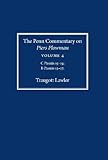The Penn Commentary on Piers Plowman, Volume 4 : C Passūs 15-19; B Passūs 13-17 / Traugott Lawler.
Material type: TextPublisher: Philadelphia : University of Pennsylvania Press, [2018]Copyright date: ©2018Description: 1 online resource (520 p.)Content type:
TextPublisher: Philadelphia : University of Pennsylvania Press, [2018]Copyright date: ©2018Description: 1 online resource (520 p.)Content type: - 9780812295122
- 821.1 23/eng/20230216
- PR2015 .L395 2018
- online - DeGruyter
| Item type | Current library | Call number | URL | Status | Notes | Barcode | |
|---|---|---|---|---|---|---|---|
 eBook
eBook
|
Biblioteca "Angelicum" Pont. Univ. S.Tommaso d'Aquino Nuvola online | online - DeGruyter (Browse shelf(Opens below)) | Online access | Not for loan (Accesso limitato) | Accesso per gli utenti autorizzati / Access for authorized users | (dgr)9780812295122 |
Browsing Biblioteca "Angelicum" Pont. Univ. S.Tommaso d'Aquino shelves, Shelving location: Nuvola online Close shelf browser (Hides shelf browser)

|

|

|

|

|

|

|
||
| online - DeGruyter Blood Matters : Studies in European Literature and Thought, 14-17 / | online - DeGruyter Human Rights in Thailand / | online - DeGruyter Between Christ and Caliph : Law, Marriage, and Christian Community in Early Islam / | online - DeGruyter The Penn Commentary on Piers Plowman, Volume 4 : C Passūs 15-19; B Passūs 13-17 / | online - DeGruyter Smarter Growth : Activism and Environmental Policy in Metropolitan Washington / | online - DeGruyter Nietzsche in the Nineteenth Century : Social Questions and Philosophical Interventions / | online - DeGruyter Strategies of Compliance with the European Court of Human Rights : Rational Choice Within Normative Constraints / |
Frontmatter -- Contents -- Note to the Reader -- Preface -- C Passus 15; B Passu¯s 13–14 -- C Passus 15; B Passu¯s 13–14 -- C Passus 17; B Passus 15 -- C Passus 18; B Passus 16 -- C Passus 19; B Passus 17 -- Works Cited -- Index -- Passages Cited
restricted access online access with authorization star
http://purl.org/coar/access_right/c_16ec
The detailed and wide-ranging Penn Commentary places the allegorical dream-vision of Piers Plowman within the literary, historical, social, and intellectual contexts of late medieval England, and within the long history of critical interpretation of the poem, assessing past scholarship while offering original materials and insights throughout. The authors' line-by-line, section by section, and passus by passus commentary on all three versions of the poem and on the stages of its multiple revisions reveals new aspects of the poem's meaning while assessing and summarizing a complex and often divisive scholarly tradition. The volumes offer an up-to-date, original, and open-ended guide to a poem whose engagement in its social world is unrivaled in English literature, and whose literary, religious, and intellectual accomplishments are uniquely powerful.The Penn Commentary is designed to be equally useful to readers of the A, B, or C texts of the poem. It is geared to readers eager to have detailed experience of Piers Plowman and other medieval literature, possessing some basic knowledge of Middle English language and literature, and interested in pondering further the particularly difficult relationships to both that this poem possesses. Others, with interest in poetry of all periods, will find the extended and detailed commentary useful precisely because it does not seek to avoid the poem's challenges but seeks instead to provoke thought about its intricacy and poetic achievements.Volume 4, by Traugott Lawler—covering passūs C.15-19 and B.13-17, the A version having ended earlier—creates a complete vade mecum for readers, identifying and translating all Latin "ations, uncovering allusions, providing full cross-reference to other parts of the poem, drawing in relevant scholarship, and unraveling difficult passages. Like the other commentaries, this volume contains an extensive overview and analysis of each passus, and the subdivisions within, large and small, and discusses all differences between the two versions. It pays careful attention to the poem at the literal level as well as to Latin texts that are analogues or even possible sources of Langland's thought and it emphasizes the comedy of the poem, of which these passūs offer a number of examples.
Mode of access: Internet via World Wide Web.
In English.
Description based on online resource; title from PDF title page (publisher's Web site, viewed 25. Jun 2024)


